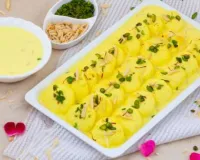Some vegetables can cause digestive issues and infections during the rainy season due to excess moisture and bacterial growth. Know which veggies to avoid in monsoon to protect your health and boost immunity naturally.
Avoid these vegetables in monsoon, otherwise you may face problems
LIFESTYLE
On
Due to changes in humidity and temperature during monsoon season, many vegetables get spoiled, infected or suffer from fungal infection. If consumed without caution, it can cause food poisoning, stomach ache, diarrhea or other digestive problems.
Today we are telling you which vegetables should be avoided during monsoon and why.
Leafy vegetables (Vegetables To Avoid During Monsoon)
Example: Spinach, fenugreek, mustard, bathua, amaranth
Problem: Mud, fungus and insects easily stick to their surface. They rot quickly in monsoon.
Caution: If you have to use it, then wash it thoroughly, boil it and then use it.
Cauliflower
Problem: Small insects and fungus can grow inside it, which are not visible.
Caution: Add salt in hot water and soak it for at least 15 minutes, then cook it.
Also Read This: If clothes smell of dampness during monsoon, then adopt these measures…
Brinjal (Vegetables To Avoid During Monsoon)
Problem: Brinjals rot quickly in monsoon and can get spoiled from inside, which is not visible from the outside.
Caution: While buying, the surface should not be soft or sunken. Use after cutting.
Soft vegetables like ladyfinger, ridge gourd, pumpkin
Problem: Bacteria and fungus grow quickly due to moisture and stickiness in them.
Caution: Wash thoroughly and cook immediately before eating.
Mushroom (Vegetables To Avoid During Monsoon)
Problem: Mushroom itself is a fungus. It becomes difficult to identify its freshness during monsoon. Harmful bacteria can grow in it.
Caution: Take only very fresh and packed mushrooms. Do not eat at all if there is a bad smell or color has changed.
Tips to keep vegetables safe during monsoon (Vegetables To Avoid During Monsoon)
1. Wash vegetables 2-3 times with water. If necessary, clean them by soaking them in mild baking soda or salt water.
2. Cook vegetables immediately. Do not keep them in the fridge for a long time.
3. Never buy wet vegetables – they start rotting quickly.
Tags:
About the author
Related Posts
Latest News
28 Jun 2025 15:21:36
For the upcoming Bihar elections, BJP is banking on a new strategy centered around Modi’s popularity, temple (mandir) politics, and...



.png)

.png)
1.png)

5.png)
4.png)
3.png)
.png)
